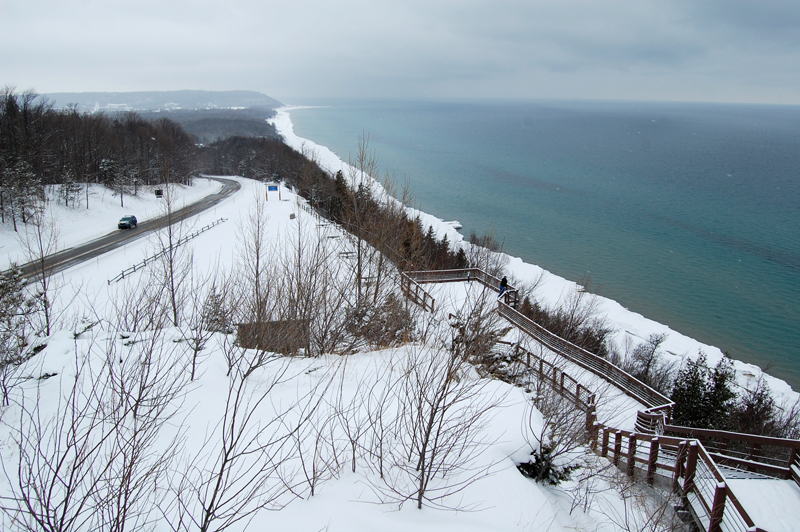-
-
It's there, hiding, across the Red Cedar River,
under trees, behind the couple walking
Professor Ellison looked even older than he was. He was tall, like Ichabod Crane, lanky, bony, with disheveled gray hair, goatee, and always with enthusiastic drool at the corners of his mouth as he talked fast, but his spirit and enthusiasm were as youthful as any of the college students he taught freshman composition.
His office was next to mine all the way at the end of the long corridor in Wonders Hall. His department had moved him to our wing from his secluded corner of an old building, because they were afraid he might die and no one would find him for days.
But they couldn’t have known him as I came to know him. Seven years in the 1990s I worked as an administrative assistant (secretary) next door to Professor Ellison. His bountiful and energetic joy radiated to all of us who encountered him while he came in for his brief office hours twice a week. What a relief from the stony, dour insolence of some professors. Some students and colleagues found him merely laughable when he rode his old English bicycle with a makeshift basket to campus and to class from his office, wiry gray hair splayed from under his helmet, and even more so on the days he strapped on roller blades. Even I didn’t know whether to laugh in glee, weep in poignancy, or cheer
Whoopeee! when I saw him teeter-walk like a toddler plodding, not gliding, on those roller blades down the carpeted hall after dousing his hair under the stream of water from the drinking fountain and mopping it from his head with his sleeves.
“Hellooo, Ruuuth!” he crooned as he cautiously leaned on, felt and stepped his hands along the wall, supporting himself all the way to me at our end of the hall as if I were his female trapeze artist partner waiting for him, urging him on, while drool or drinking fountain water ran down his cheeks and chin. His eyes flickered and twinkled like blinking lights at the county fair on those wild and spider-leggy rides. His smile never disappeared, a foul word never dropped from his lips.
It just so happened that it was in those days that I began taking classes to finish my BA via the generous educational assistance offered at my university to secretaries and other union members. I got to take fourteen credits a year for free. I began with two American Lit classes, reading Hawthorne, Irving, Cooper. On I waded deep across the Atlantic into Brit Lit and Conrad, Joyce and Woolf. Finally I came to poetry writing and five classes with Diane Wakoski. I worked on poems on my lunch hour and off and on through the workday tweaking a word here and there, surrounded by inspirational poems from Bishop, Blake, Williams and Bukowski I’d printed and taped on the wall in front of my desk and on the file cabinet. It was a time in my life journey of great spiritual searching and angst, which got written into my poems, a time of losing faith, and hoping to find it again. The writing was the door I went through, the room where I could light altar candles in front of old statues of the past, and whisper chilled prayers for my nearly hollow soul.
Professor Ellison was ceaselessly interested in my class work. We were very fond of each other, plus I was a nontraditional (older) student, unlike his first year freshmen he taught writing, and he eagerly asked first thing every morning about the critical analysis papers I was writing for English classes. He taught me to stop writing
I think . . . and just write my thoughts directly. What I write is obviously what I think! As I moved into poetry writing, he was my main reader besides Don, and what a help he was. He didn’t know my story as Don did, and so he was the objective reader every writer needs, to tell you if they “get it” just from your words on the page.
One day, I sat at my desk doing something or other, and Prof. Ellison poked his head in the door with his bright, moist cheer, “Ruth! Have you seen the aconite?!”
“The
wha?”
“Aconite, winter aconite! It’s blooming over by the river!”
After his pleasant dismay that I had never heard of nor witnessed this precious secret, Professor Ellison educated me about the tiny yellow flower that grows on vines close to the ground under a tree over by the Red Cedar River, in the Beal garden created and named for the famous botanist Professor William J. Beal. It first pokes its yellow blooms up through snow in February. I promised him I would check it out.
This photo was taken
two years ago in February,
when rain had melted the snow
I did, and there it was, a yellow and green surprise alive in the snow, first sign of spring. It inspired a poem, a little haiku, which I turned in for class, and happily Professor Wakoski thought it was successful. For me, this haiku and its title “Faith,” symbolizes an important turning point in my life, from leaving the religious faith of my past that had darkened into a long winter of confining and frustrating emptiness. As I learned to write, with the generous contributions of three professors, something eternal began to sprout.
Yesterday I walked over from my office (in the English department where I graduated) to the river to find aconite again, and there it was, the same small answer, like my poem.
Faith
Faith is aconite
rising in February
warm in the snow bed.
These photos were taken yesterday.
-
-






























































